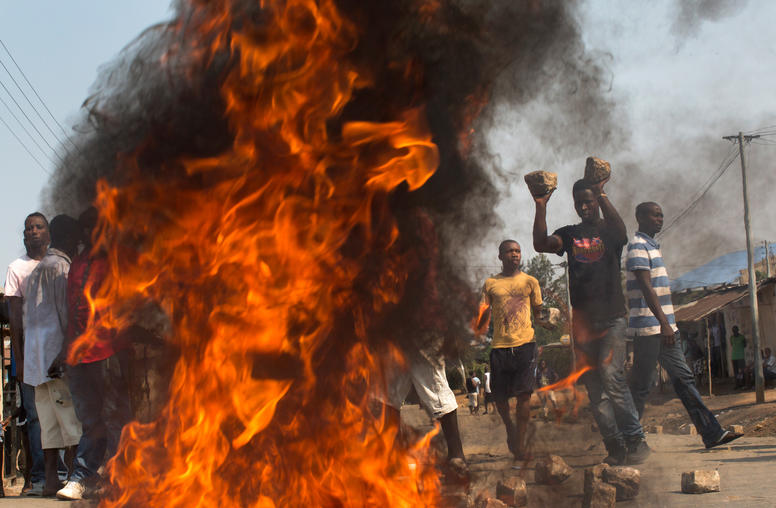Research & Analysis
U.S. Institute of Peace’s articles, reports, tools and other features provide policy analysis, research findings, and practitioner guides. These publications examine critical conflict issues at the center of the Institute’s work to prevent and resolve violent conflict.
The views expressed in these publications are those of the author(s).

Four Lessons from Outbreaks in Africa for the Age of Coronavirus
As the coronavirus pandemic continues and new behavioral practices—from social distancing to avoiding handshakes and hugs—become expected norms overnight, there are crucial policy lessons to be learned from struggles against previous outbreaks of disease in Africa. Despite widespread poverty, weak infrastructure, and relatively few health professionals, there is an encouraging, long record of African countries—often with significant international assistance and cooperation—eventually managing to overcome dire health challenges. For non-African countries already facing large numbers of COVID-19 infections, as well as for African countries where the epidemic is now at an early stage, policymakers would do well to recall these four lessons of past epidemics—of both what to do and, perhaps almost as importantly, what not to do to confront this global threat.

Jonas Claes on Election Risk in the Democratic Republic of Congo and Ukraine
Jonas Claes provides risk analysis for elections taking place in the Democratic Republic of Congo in December and in Ukraine in March, 2019. A combination of complicating factors ranging from ongoing conflicts, outside meddling, logistical hurdles and voter apathy top Claes’ concerns that election violence could be stoked in both elections.

The U.S. Can’t Give Up on Africa’s Crises
After a trip to assess humanitarian crises in some of the world’s most troubled nations, U.S. Senator Jeff Merkley said he concluded that a matrix of conflict, corruption and “climate chaos” is driving one of the biggest periods of displacement in modern history.

U.S. Signals Africa Policy Shifts
The U.S. plans to continue diplomatic and military support for African nations but expects its counterparts to step up significantly in areas ranging from fighting corruption to countering terrorism and stopping arms purchases from North Korea, U.S. officials said during a symposium at the U.S. Institute of Peace.

Q&A: What Works in Preventing Election Violence
The elections this year in the Philippines, the Democratic Republic of the Congo, Gabon and even the United States, demonstrate how high-stakes elections frequently trigger anxiety, tension or even violence or the threat of unrest. Properly managed elections allow opposing groups to press their claim to power through a peaceful process. But in fragile democracies, elections frequently feature intimidation or violent protest. U.S. Institute of Peace Senior Program Officer Jonas Claes, editor o...

Unlearning Violence: Democratic Republic of the Congo
Martin Luther King Jr. reminds us that “Human progress is neither automatic nor inevitable…” So when we see steps toward justice and a narrative of hope returning to a country worn by violence and conflict, those of us in the peacebuilding field feel reinvigorated. We were fortunate to see an example on July 14, when the Embassy of the Democratic Republic of the Congo co-sponsored with USIP a discussion with that country’s Personal Representative of the President in Charge of the Fight Against Sexual Violence and Child Recruitment, Jeanine Mabunda Lioko Mudiayi.

Feingold Presses Three African States on Elections
Russell Feingold, the U.S. Special Envoy working to stabilize Africa’s Great Lakes region, urged Rwanda, Burundi and the Democratic Republic of Congo (DRC) to hold fair, democratic elections as a key step to bringing peace to the region. And he pressed the DRC to launch a promised military offensive in the country’s East against an ethnic Hutu militia that includes fighters who participated in the anti-Tutsi genocide in Rwanda 21 years ago.

National Security Advisor Rice Vows Long-Term Ties with Africa
National Security Advisor Susan Rice drew attention to Africa's progress in the past two decades and its possibilities for economic growth, good governance and long-term stability, in a speech at the U.S. Institute of Peace on the eve of next week's U.S.-Africa Leaders Summit.

Feingold Urges DRC Reforms, Great Lakes Regional Cooperation in Remarks at USIP
Africa's Great Lakes region is ripe for progress in resolving its deadly conflicts, particularly in the eastern part of the Democratic Republic of Congo (DRC), but it will take deeper regional cooperation and the DRC's full implementation of internal reforms that it has already agreed to, Russell D. Feingold, the U.S. special envoy for the Great Lakes and the DRC, said at the U.S. Institute of Peace (USIP) on February 20.

More International Engagement on DRC Needed, Former U.N. Special Rep Says at USIP
The Democratic Republic of the Congo (DRC), though afflicted by conflict for nearly two decades, has made limited progress on several key issues but needs continued international support and engagement to help consolidate the gains, the former special representative to the United Nations secretary general told an audience at the Institute on December 11.